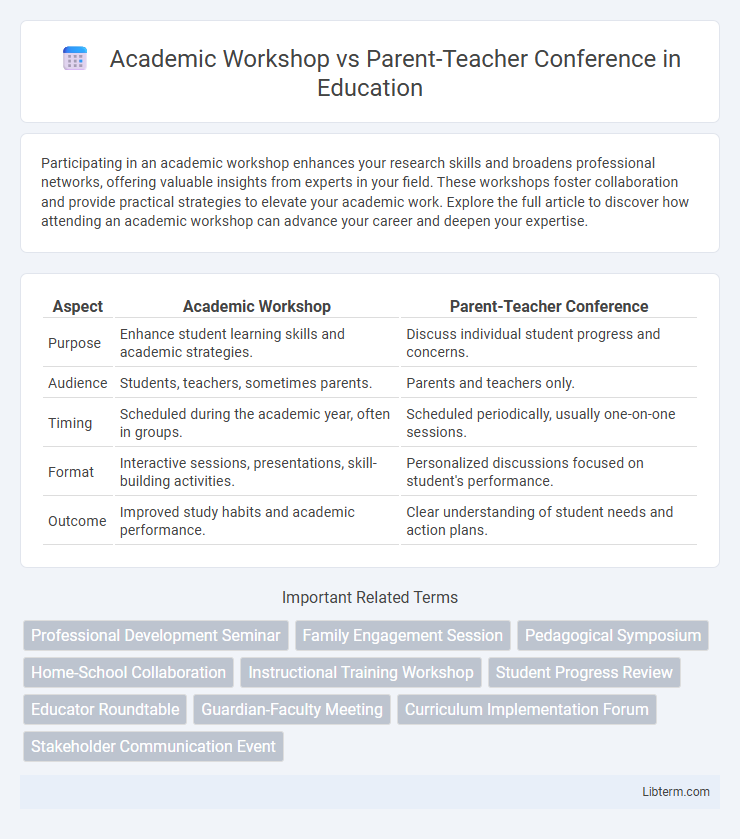Participating in an academic workshop enhances your research skills and broadens professional networks, offering valuable insights from experts in your field. These workshops foster collaboration and provide practical strategies to elevate your academic work. Explore the full article to discover how attending an academic workshop can advance your career and deepen your expertise.
Table of Comparison
| Aspect | Academic Workshop | Parent-Teacher Conference |
|---|---|---|
| Purpose | Enhance student learning skills and academic strategies. | Discuss individual student progress and concerns. |
| Audience | Students, teachers, sometimes parents. | Parents and teachers only. |
| Timing | Scheduled during the academic year, often in groups. | Scheduled periodically, usually one-on-one sessions. |
| Format | Interactive sessions, presentations, skill-building activities. | Personalized discussions focused on student's performance. |
| Outcome | Improved study habits and academic performance. | Clear understanding of student needs and action plans. |
Understanding Academic Workshops
Academic workshops provide interactive sessions designed to enhance students' learning strategies and subject comprehension through hands-on activities and expert guidance. Unlike parent-teacher conferences, which focus on individual student progress and parent-teacher communication, academic workshops emphasize collaborative skill development and practical application of knowledge. These workshops often cover topics such as study techniques, time management, and specific academic subjects, fostering a deeper understanding and improved performance.
Defining Parent-Teacher Conferences
Parent-teacher conferences are scheduled meetings between educators and parents to discuss a student's academic progress, behavior, and development. These conferences provide a structured opportunity for personalized communication, goal setting, and problem-solving regarding the student's educational experience. Unlike academic workshops, which focus on skill-building and information for parents, parent-teacher conferences center on individual student evaluation and collaborative support strategies.
Key Objectives: Workshop vs Conference
Academic workshops aim to provide students with targeted skills and knowledge enhancement through interactive sessions and practical activities, fostering deeper subject comprehension. Parent-teacher conferences focus on personalized communication between parents and educators to discuss a student's academic progress, behavior, and developmental needs. Workshops emphasize skill-building and learning strategies, whereas conferences prioritize progress evaluation and collaborative support for student success.
Participants and Their Roles
Academic workshops primarily involve teachers and students engaging collaboratively to deepen subject knowledge and develop skills through interactive activities. Parent-teacher conferences focus on direct communication between parents and teachers to discuss a student's academic progress, behavior, and individualized support strategies. Teachers act as facilitators and informants in both settings, while students actively participate in workshops, and parents provide insights and receive feedback during conferences.
Frequency and Scheduling
Academic workshops are typically scheduled periodically, often once per semester or academic year, allowing in-depth exploration of specific topics or skills over a few hours or days. Parent-teacher conferences occur more frequently, commonly once per term or quarter, focusing on individual student progress in shorter, scheduled meetings. These differing frequencies and formats reflect their distinct purposes: workshops for broader educational engagement and conferences for personalized communication.
Format and Structure Differences
Academic workshops typically feature interactive sessions with presentations, group activities, and hands-on learning designed to engage students, parents, and educators collectively. Parent-teacher conferences are structured as one-on-one meetings focused on individual student performance, allowing personalized discussions about academic progress and behavioral concerns. Workshops often follow a scheduled agenda for multiple participants, while conferences prioritize private, individualized time slots for detailed parent-teacher communication.
Communication Styles in Each Setting
Academic workshops foster interactive, collaborative communication where educators and parents engage in skill-building activities and open discussions to enhance student learning. Parent-teacher conferences emphasize personalized, direct dialogue, focusing on individual student progress, concerns, and goal-setting through a more formal, one-on-one exchange. The workshop setting encourages collective problem-solving and proactive strategies, while conferences prioritize targeted feedback and personalized parent involvement.
Benefits for Students
Academic workshops provide students with targeted skill development and interactive learning opportunities that directly enhance their academic performance. Parent-teacher conferences facilitate personalized communication, enabling parents to understand their child's progress and collaborate on strategies for improvement. Both formats support student success by fostering engagement, motivation, and a tailored approach to education.
Challenges and Limitations
Academic workshops often face challenges such as limited parent participation due to scheduling conflicts and lack of awareness, which can hinder effective communication and engagement. Parent-teacher conferences may struggle with time constraints and insufficient preparation, limiting the depth of discussion about student progress and personalized support. Both formats encounter barriers in addressing diverse family needs, cultural differences, and language proficiency, impacting their overall effectiveness in fostering student success.
Choosing the Right Approach
Choosing between an academic workshop and a parent-teacher conference depends on the desired engagement level and information depth. Academic workshops offer interactive learning experiences for parents to understand curriculum and teaching methods, fostering proactive support for students. Parent-teacher conferences provide personalized feedback on individual student progress and address specific concerns, making them ideal for targeted communication.
Academic Workshop Infographic

 libterm.com
libterm.com